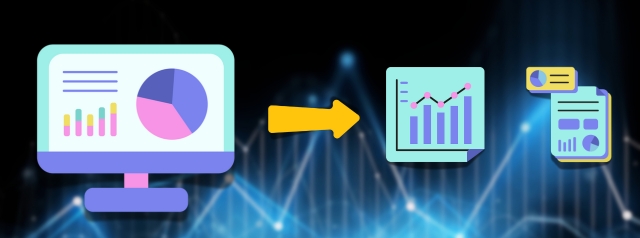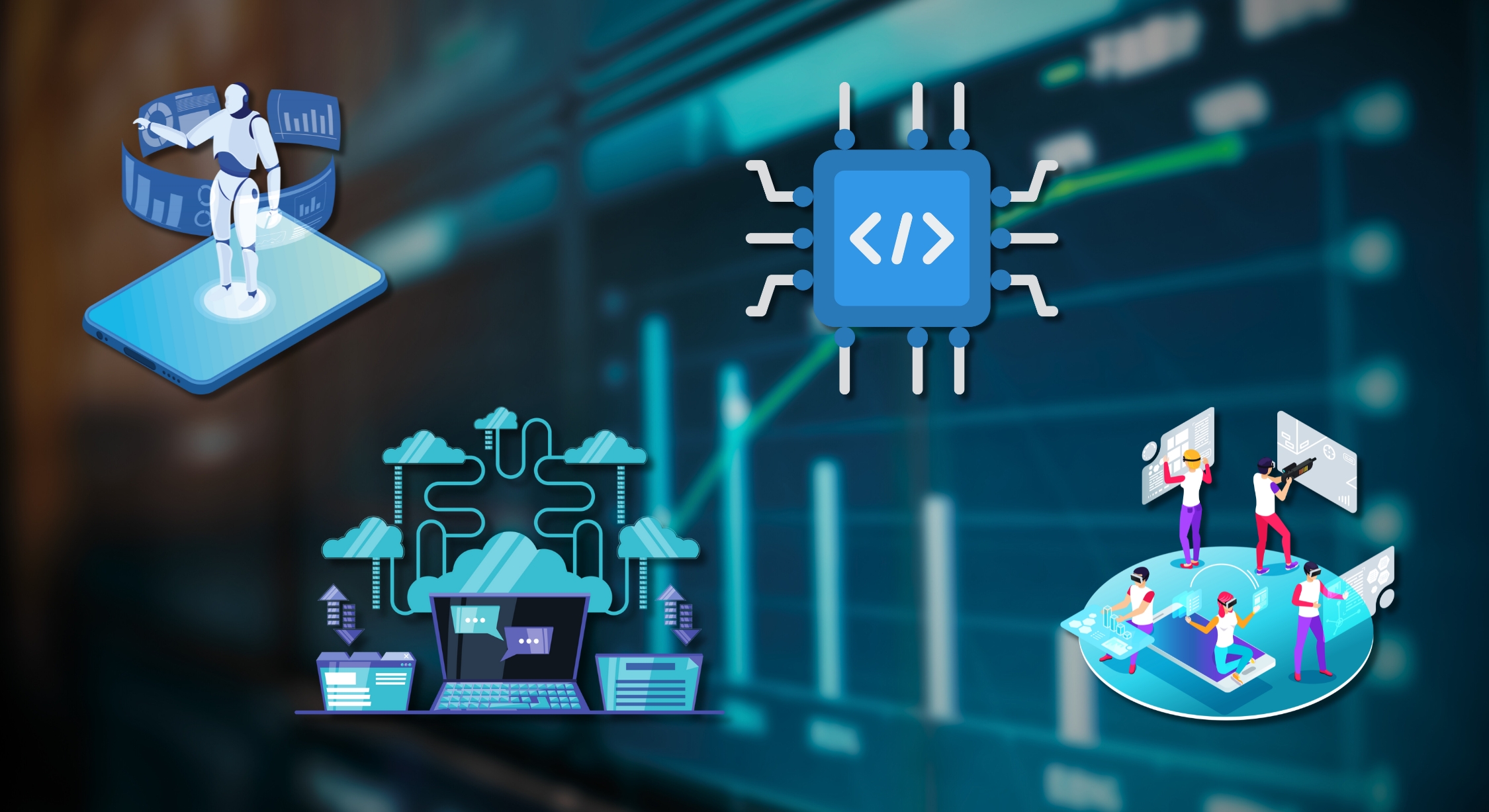At Experion Technologies, we specialize in delivering cutting-edge Enterprise Business Intelligence Platforms (EBIP) that empower organizations to harness the full potential of their data. In today’s data-driven world, leveraging the right tools for business intelligence (BI) is essential for organizations aiming to stay ahead. Enterprise Business Intelligence Platforms (EBIP) empower businesses to make informed decisions, optimize operations, and gain a competitive edge.
What is Enterprise Business Intelligence?

Enterprise Business Intelligence (BI) refers to a set of technologies, tools, and practices used by organizations to collect, integrate, analyze, and present business data to support decision-making processes. These platforms are designed to help businesses make sense of large volumes of data from multiple sources, including internal systems like CRM, ERP, and databases, as well as external data sources.
In the context of today’s fast-paced and data-driven world, it’s more critical than ever for businesses to leverage data effectively. Enterprise BI solutions provide the infrastructure necessary to manage this complexity, offering a centralized platform where users can access data and insights at their fingertips.
Importance of Data-Driven Decision-Making for Enterprises
Data-driven decision-making has become a fundamental requirement for enterprises striving to maintain a competitive advantage. By using data to guide their decisions, organizations can move away from intuition-based decisions and towards strategies grounded in facts and insights. This approach allows enterprises to mitigate risks, optimize operations, identify new opportunities, and improve overall performance.
With custom enterprise business intelligence platforms, organizations can align their data strategy with business objectives, ensuring that decisions are based on comprehensive, real-time insights. This leads to faster, more accurate decision-making, allowing businesses to remain agile and responsive to market changes.
Key Role BI Platforms Play in Modern Business Environments
Enterprise BI platforms are the backbone of modern data analytics, providing businesses with the necessary tools to make informed decisions. These platforms support the transformation of raw data into actionable insights, helping organizations improve processes and enhance their decision-making capabilities.
In today’s competitive environment, businesses cannot afford to operate without leveraging the power of data. Enterprise BI solutions centralize data from multiple sources, making it easier for teams to access and analyze information quickly. Real-time access to data through advanced analytics tools and interactive dashboards enables organizations to monitor performance, identify trends, and act proactively.
Enterprise BI platforms help businesses streamline operations, automate reporting, and enhance collaboration across teams. Whether it’s through providing instant insights into customer behavior, sales performance, or operational efficiency, BI platforms ensure that the organization stays informed, aligned, and on the path to growth.
Moreover, custom enterprise business intelligence platforms offer the flexibility to adapt to specific business needs. These tailored solutions enable organizations to focus on their unique challenges, integrate seamlessly with existing systems, and provide a more personalized experience that enhances the value of business intelligence.
What Are Enterprise Business Intelligence Platforms?

Enterprise Business Intelligence (BI) platforms are powerful, all-encompassing software solutions designed to manage, analyze, and present large volumes of data across an organization. These platforms integrate multiple data sources, enabling businesses to derive actionable insights that support strategic decision-making at all levels of the organization.
In essence, an enterprise BI platform acts as the central hub for an organization’s data ecosystem, providing a unified view of key performance indicators (KPIs), metrics, and trends. By consolidating data from various systems—such as Customer Relationship Management (CRM), Enterprise Resource Planning (ERP), databases, and external sources—these platforms allow businesses to create comprehensive reports, dashboards, and visualizations that are accessible to decision-makers across departments.
Real-Time Data Access and Analysis
One of the defining features of enterprise business intelligence platforms is their ability to provide real-time access to data. In today’s fast-moving business environment, decisions must be made quickly, and having instant access to up-to-date data is critical. Enterprise BI platforms ensure that business leaders can access the most current information from a variety of sources, enabling faster, more accurate decision-making.
For example, a sales team can access up-to-the-minute performance data to adjust strategies or react to changes in market conditions. Similarly, the finance department can quickly assess financial data, enabling them to make timely forecasts or adjustments. The ability to process and analyze data in real time gives organizations a significant advantage over competitors who are relying on outdated or incomplete information.
Data Integration Across Multiple Sources
Enterprise business intelligence platforms excel at integrating data from disparate sources. In large organizations, data is often scattered across various departments and systems, creating silos that hinder effective analysis. BI platforms break down these barriers by connecting data from a wide range of sources into a single platform.
For example, an enterprise BI solution can pull data from ERP systems for financial insights, from CRM systems for customer-related information, and from external sources like market data or social media feeds to provide a complete view of the business landscape. By centralizing this data, organizations can gain a more holistic understanding of their operations, uncover hidden patterns, and make more informed decisions that drive growth and efficiency.
Scalable and Flexible for Enterprise Needs
Enterprise BI platforms are built to scale with an organization’s growth. As a company expands and the volume of data increases, the BI platform can accommodate this growth without compromising performance. Whether an organization has thousands of employees or operates across multiple regions, an enterprise BI solution can scale to meet the evolving needs of the business.
This flexibility is especially important for companies looking for long-term solutions. With the rise of big data and emerging technologies, an enterprise BI platform ensures that businesses are equipped to handle increasing data volumes, more complex analysis, and greater demands for real-time insights.
Collaboration and Sharing of Insights
Enterprise BI platforms are not just tools for individual users; they are designed to foster collaboration across teams and departments. Through shared dashboards, reports, and interactive visualizations, these platforms enable teams to collaborate more effectively by providing a centralized view of key data.
For instance, a marketing team can use the platform to track campaign performance, while the finance team can review budget utilization, and the sales team can monitor lead conversion rates—all using the same data set. This collaborative approach ensures alignment across departments, leading to better decision-making and more effective execution of business strategies.
Enterprise BI Solutions That Drive Efficiency
An enterprise BI platform’s ability to automate data processing, reporting, and analysis is a major driver of efficiency. By automating these tasks, organizations can significantly reduce the manual effort involved in data management and reporting. This automation leads to faster reporting cycles, more accurate data insights, and fewer errors in decision-making processes.
Custom enterprise business intelligence platforms take this efficiency even further by tailoring features to meet the specific needs of the organization. By aligning the platform with the company’s goals and workflows, businesses can ensure that their BI solution is optimized for maximum impact, helping to drive growth, enhance performance, and boost overall efficiency.
Unlocking the Potential of Enterprise Business Intelligence Software
Enterprise Business Intelligence (BI) software has undergone a significant transformation over the years, evolving from basic reporting tools to sophisticated platforms that integrate vast and diverse data sources. Today, these enterprise business intelligence platforms are crucial for organizations that want to harness the full potential of their data, gain predictive insights, and drive smarter decision-making. With advanced analytics, real-time processing, and interactive visualizations, these platforms help businesses unlock valuable insights from their data, empowering them to make informed, data-driven decisions.
Difference Between Traditional BI Tools and Modern Enterprise BI Platforms
Traditional BI tools were often limited in their ability to handle large volumes of data, scale with the growing demands of modern businesses, or integrate seamlessly with new and varied data sources. These tools usually required manual data extraction and were often siloed within specific departments or systems, which meant slower insights and inefficient reporting processes.
In contrast, modern enterprise BI platforms offer scalability and flexibility, enabling them to handle the vast amounts of data that organizations generate daily. They integrate with a wide range of data sources, whether on-premise or cloud-based, and provide real-time data processing for faster insights. The advanced capabilities of modern enterprise BI platforms also include interactive dashboards, predictive analytics, and AI-driven insights, which go far beyond the capabilities of traditional BI tools. This evolution has drastically improved businesses’ ability to leverage data for strategic planning and operational efficiency.
By adopting these advanced enterprise business intelligence solution, companies can break down data silos and create a unified view of their operations, leading to more agile and informed decision-making. The benefits are clear: faster insights, better predictions, and a more responsive approach to market demands.
Custom Enterprise Business Intelligence Platforms
Not all businesses have the same needs when it comes to business intelligence. While many enterprise platforms offer off-the-shelf solutions, custom enterprise business intelligence platforms are tailored to meet the unique requirements of specific organizations. These custom-built solutions allow businesses to fine-tune their BI platforms to align with their data sources, workflows, and decision-making processes.
A custom enterprise BI platform ensures that businesses can maximize the value of their BI investments by integrating proprietary or specialized data sources, optimizing workflows, and providing the specific tools needed for their industry or market segment. This tailored approach means that businesses don’t have to rely on generalized BI tools but instead can create a business intelligence solution that addresses their exact needs, making it more effective and efficient in driving business outcomes.
Key Features of Enterprise BI Platforms

- Data Integration and ETL (Extract, Transform, Load)
A core feature of enterprise business intelligence platforms is their ability to seamlessly integrate data from multiple sources. Whether it’s data from Customer Relationship Management (CRM) systems, Enterprise Resource Planning (ERP) software, or databases, enterprise BI platforms are designed to connect and unify this data for comprehensive analysis. Using the ETL process—Extract, Transform, and Load—these platforms collect data, standardize it, and store it in a centralized data warehouse.
The ability to perform real-time or batch processing allows businesses to access accurate and up-to-date data at any time, providing the agility needed for rapid decision-making. Enterprise business intelligence solutions that support smooth data integration ensure that organizations can break down data silos and get a holistic view of their operations.
- Interactive Dashboards and Data Visualization
One of the most important aspects of any enterprise BI platform is its ability to present data in a clear and actionable way. Interactive dashboards and advanced data visualizations play a key role in making data more accessible and understandable to users at all levels of the organization.
Customizable dashboards allow users to set up their own preferred data views, enabling them to focus on the metrics that matter most. With tools like heatmaps, dynamic charts, and graphs, users can easily interpret complex datasets, uncover trends, and make data-driven decisions quickly. Best business intelligence platforms are equipped with these advanced visualization features, ensuring that businesses can leverage data insights effectively for competitive advantage.
- Advanced Analytics and AI/ML Integration
Modern enterprise business intelligence platforms go beyond just reporting by offering advanced analytics capabilities. These platforms enable businesses to perform a variety of analyses, from descriptive analytics (which helps organizations understand what happened in the past) to diagnostic analytics (which explains why something happened) and predictive analytics (which forecasts future trends).
AI and machine learning (ML) integration further enhances these capabilities, allowing the BI platform to automatically generate insights, recommendations, and even identify patterns that humans might miss. This not only speeds up the decision-making process but also ensures that businesses can anticipate market shifts, customer behaviors, and operational inefficiencies, thereby optimizing strategies.
By incorporating AI and ML, these enterprise BI solutions help organizations stay ahead of the curve, making faster and more accurate decisions based on predictive data. The use of AI-driven insights also adds an element of automation, ensuring that decision-makers receive timely recommendations that drive efficiency and growth.
- Collaboration and Sharing
Collaboration is an essential part of today’s business environment, and enterprise BI platforms facilitate this through shared dashboards, reports, and alerts. Real-time collaboration features allow teams across departments to work together by sharing the same insights and metrics, helping them stay aligned in decision-making.
For example, the marketing team can analyze customer engagement data, the finance department can review budget allocations, and the operations team can track supply chain performance—all using the same platform. By having a unified view of key business metrics, teams can work together more effectively, improving alignment and decision-making throughout the organization.
- Data Security and Governance
Data security and governance are paramount when dealing with sensitive business data. Enterprise BI platforms implement strong security protocols to protect data privacy and ensure compliance with regulations such as GDPR, HIPAA, and others. These platforms offer role-based access controls, audit trails, and encryption to secure sensitive information.
Moreover, enterprise business intelligence solutions provide businesses with tools to maintain proper data governance, ensuring that only authorized users have access to specific data. By managing data securely and maintaining a transparent audit trail, these platforms help organizations mitigate risks and ensure compliance with industry standards.
Benefits of Implementing Enterprise BI Platforms
- Enhanced Decision-Making
In today’s fast-paced business environment, making timely and informed decisions is paramount. Enterprise Business Intelligence (BI) platforms provide organizations with real-time access to data, enabling decision-makers to base their strategies on accurate and up-to-date insights. By utilizing data analytics, businesses can identify emerging trends, potential risks, and opportunities, ensuring decisions are not made on intuition but on solid data. This leads to better outcomes across various operational areas, from marketing to financial planning, fostering growth and profitability. - Improved Operational Efficiency
Traditionally, gathering and analyzing data involved labor-intensive processes, often requiring manual reporting. With enterprise BI platforms, reporting, data collection, and analytics become automated, reducing the time spent on these tasks. This streamlining enhances operational efficiency, allowing teams to focus on more strategic initiatives. Additionally, automation in reporting ensures faster response times, empowering employees to make quicker decisions that align with the organization’s overall strategy. - Better Customer Understanding
Understanding customer behavior is key to staying competitive. With enterprise business intelligence solutions, organizations can dive deeper into customer interactions, segment audiences, and analyze buying patterns. This data allows businesses to tailor products, services, and marketing strategies to meet the needs and preferences of their customers. By unlocking deeper customer insights, enterprises can build stronger, more personalized relationships, improving customer satisfaction and loyalty. - Scalability and Flexibility
As businesses grow, so does their data. Traditional systems may struggle to handle vast amounts of data, but enterprise BI platforms are designed with scalability in mind. These platforms can adapt to growing data volumes and evolving business needs, ensuring that organizations can continue to gain insights as they expand. Whether a company operates on a local or global scale, an enterprise BI platform can scale to accommodate data from multiple sources, offering businesses the flexibility they need to succeed in a rapidly changing market. - Cost Savings
Implementing an enterprise BI platform can also help organizations reduce operational costs. By automating data analysis and reporting, businesses can free up resources that would otherwise be spent on manual processes. Moreover, these platforms provide insights that can help streamline processes, identify inefficiencies, and optimize resource allocation. For example, businesses can reduce inventory costs by better predicting demand patterns or improve staffing efficiency through data-driven workforce management.
Experion Technologies helps businesses harness the full potential of enterprise business intelligence platforms by offering tailored solutions that align with each organization’s unique data needs. Our expert team ensures that our clients receive actionable insights to drive growth and improve operational performance.
Challenges in Adopting Enterprise Business Intelligence Platforms
- Data Silos
One of the biggest challenges organizations face when implementing enterprise BI platforms is the existence of data silos. Data silos occur when different departments or business units store their data in separate, unconnected systems. This fragmentation can lead to incomplete insights, making it difficult for decision-makers to get a comprehensive view of the organization’s operations. To unlock the full potential of BI, businesses need to integrate disparate data sources, ensuring that data flows seamlessly across the enterprise. - User Adoption and Training
For an enterprise BI platform to succeed, user adoption is critical. Resistance to new technologies and inadequate training can hinder the effectiveness of BI tools. Employees need to be familiar with how to use the system, how to interpret data, and how to leverage the platform’s capabilities to make informed decisions. Organizations must invest in training and ensure that users at all levels are comfortable with the platform to reap the full benefits of the investment. - Data Quality Issues
The effectiveness of enterprise business intelligence is only as good as the quality of the data it relies on. Inconsistent, incomplete, or outdated data can lead to inaccurate insights and decisions. It is crucial for businesses to have data governance processes in place to maintain high-quality, reliable data. This includes cleaning and validating data before it is used for analysis, as well as continuously monitoring and improving data quality over time. - High Implementation Costs
The upfront investment required to implement enterprise BI platforms can be a significant barrier, especially for smaller organizations. Along with the cost of the software, businesses must also consider the costs of customization, integration with existing systems, and ongoing maintenance. While these platforms offer long-term benefits, such as improved decision-making and cost savings, the initial investment may deter some companies from making the leap. However, organizations should view the adoption of BI tools as an investment in their future growth, as the value of insights provided by these platforms typically far outweighs the implementation costs. - Security and Compliance Concerns
As businesses gather and store large amounts of sensitive data, ensuring security and compliance with industry regulations becomes a priority. Enterprise BI platforms must be equipped with robust security measures, such as encryption, role-based access controls, and audit trails. Furthermore, organizations must ensure that the BI tools they use comply with regulatory standards, such as GDPR or HIPAA, to avoid potential legal and financial penalties.
Top Trends in Enterprise Business Intelligence Platforms

AI and Machine Learning Integration
Artificial Intelligence (AI) and Machine Learning (ML) are transforming enterprise BI platforms by providing advanced analytics capabilities. These technologies enable businesses to automate insights, forecast trends, and uncover patterns that would otherwise go unnoticed. By integrating AI and ML into their BI platforms, organizations can make more accurate predictions, optimize business processes, and gain a competitive advantage by reacting faster to changes in the market.
Self-Service BI
One of the major trends in enterprise BI platforms is the shift toward self-service BI. This trend empowers non-technical users to create their own reports, dashboards, and data visualizations without relying on IT departments. Self-service BI tools offer intuitive interfaces that allow users to access and analyze data independently, speeding up decision-making processes and reducing the strain on IT teams. This trend helps democratize data within an organization, enabling more employees to make data-driven decisions.
Cloud-Based BI Solutions
Cloud-based enterprise BI platforms are gaining popularity due to their scalability, flexibility, and cost-efficiency. These platforms allow businesses to access data from anywhere, collaborate in real time, and scale resources as needed. Cloud solutions also reduce the need for expensive on-premises infrastructure, making them an attractive option for businesses seeking to optimize their BI strategy while reducing costs.
Embedded Analytics
Embedded analytics integrates BI functionalities directly into an organization’s existing applications, such as ERP or CRM systems. By embedding real-time data insights within the tools employees already use, businesses can enhance the decision-making process without having to switch between different applications. This improves efficiency, promotes data-driven decision-making, and provides seamless access to insights.
Augmented Analytics
Augmented analytics leverages AI and natural language processing (NLP) to provide automated insights and recommendations. By analyzing data patterns and trends, augmented analytics can uncover hidden opportunities or risks and present them to users in an easily digestible format. This enables businesses to make informed decisions faster, boosting operational agility and enhancing overall performance.
Future of Enterprise Business Intelligence Platforms
The future of enterprise BI platforms will be shaped by emerging technologies like the Internet of Things (IoT) and edge computing, which enable businesses to gather and analyze data from a variety of new sources. As more devices and sensors are connected, the volume and complexity of data will increase, making advanced analytics even more critical. Additionally, there is a growing emphasis on data democratization, where more employees across the organization are empowered to use enterprise BI platforms for decision-making. This shift, coupled with ongoing advancements in AI and automation, will continue to transform how businesses analyze, interpret, and leverage data.
How Experion Can Help You With Enterprise BI Platforms

At Experion Technologies, we specialize in delivering custom enterprise business intelligence platforms tailored to meet your organization’s specific data needs. Our deep expertise in data integration, advanced analytics, and real-time decision-making enables businesses to unlock the full potential of their data, empowering growth and operational efficiency.
Conclusion
In today’s fast-paced business world, adopting the right enterprise business intelligence platform is crucial for organizations seeking to stay ahead. By leveraging data to drive strategic decisions, improve efficiency, and gain insights into customer behavior, businesses can maintain a competitive edge. With enterprise BI platforms, companies can unlock the full potential of their data, optimize operations, and enhance performance, positioning themselves for long-term success.
Key Takeaways
- Enterprise BI platforms are essential for data-driven decision-making.
- Custom enterprise BI solutions are built to align with specific organizational goals.
- Adopting the right enterprise BI platform improves efficiency, customer understanding, and scalability.
- AI and Machine Learning integration enhances predictive analytics and business insights.
- Self-service BI tools allow users without technical expertise to work with data independently, speeding up decision-making.
- Cloud-based BI solutions provide scalability, flexibility, and cost-efficiency for modern businesses.
- Data democratization promotes a culture of transparency by making insights available to employees’ organization-wide.
- Embedded analytics integrates data insights into everyday tools, improving workflow efficiency.
- Augmented analytics, powered by AI and NLP, uncovers hidden insights and helps businesses make faster, informed decisions.
- Security and compliance are critical to ensuring data integrity and meeting industry standards.
At Experion Technologies, we help businesses unlock the full potential of their data by delivering custom, scalable, and secure enterprise BI solutions tailored to your unique needs.

